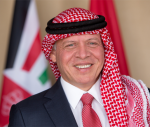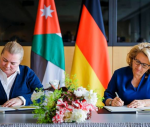You are here
Libya's western gov't hands power to unity team
By AFP - Mar 17,2021 - Last updated at Mar 17,2021
TRIPOLI/ TUNIS — Libya's Fayez Al Sarraj, outgoing head of the western-based Government of National Accord (GNA), formally handed over power Tuesday to a new interim executive hoped to unify the divided and war-torn nation.
Sarraj, who has led the UN-recognised GNA since it was set up in 2016, stepped down from the role in a ceremony in Tripoli, one day after the new interim Prime Minister Abdul Hamid Dbeibah and a three-member presidency council took the oath of office in parliament.
The new Government of National Unity (GNU), selected through a UN-supported process, is the latest internationally backed bid to end a decade of chaos in the North African nation and unite rival administrations.
Libya descended into conflict after leader Muammar Qadhafi was toppled and killed in a NATO-backed uprising in 2011, with an array of forces battling to fill the void.
The new administration is hoped to replace both the GNA in Tripoli and a parallel Cabinet headquartered in the east, under the de facto control of forces backing military strongman Khalifa Haftar.
Sarraj gave a brief speech in which he recalled the “endless difficulties” his government had faced.
Those included “the war on terrorism”, the failed 2019 offensive by Haftar’s forces to seize Tripoli, as well as “foreign interference”.
Sarraj and the GNA had never won support of the eastern-based parliament.
Dbeibah, a 61-year-old engineer and businessman, was selected on last month by a forum of 75 Libyan delegates at UN-led talks in Switzerland.
Last week parliament approved his choice of cabinet, a government he has said he hopes “will be the government of all Libyans”.
Haftar last month offered “the support of the armed forces for the peace process”.
Tunisia’s president will travel to Libya Wednesday for the first such visit between the neighbouring countries since 2012, his office announced, in a boost for Libya’s new UN-backed administration.
President Kais Saied’s trip aims to show “Tunisia’s support for the democratic process in Libya” following the swearing in on Monday of Dbeibah on a pledge to reunite the divided country and lead it to December elections, the president’s office said.
The visit also aims to “strengthen cooperation between Tunisia and Libya” and to develop “solidarity” for increased “stability and prosperity”, it added.
No details on Saied’s programme were provided.
Tunisia hosted UN-backed talks between representatives of Libya’s warring factions late last year that helped pave the way for the fragile breakthrough.
Successive Tunisian governments strove to avoid publicly taking sides between Libya’s rival administrations in the east and west that fought themselves to a bloody standstill before making way this week for the new UN-backed unity government led by Dbeibah.
Related Articles
TRIPOLI — Libya has been mired in chaos since the ouster and killing of dictator Muammar Qadhafi in 2011, with two rival authorities and a m
TRIPOLI, Libya — Libya, which has seen more than a week of deadly clashes between rival militias around Tripoli, fell into chaos with the ou
TRIPOLI — Libya’s UN-backed unity government has suffered a new setback after a political rival seized key offices in the capital and procla
















